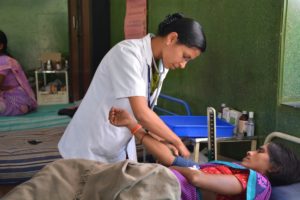Acknowledging psycho-social factors in Tuberculosis treatment
With timely diagnosis and correct treatment, most people who develop tuberculosis can be cured, and yet in 2015, it was one of the top ten causes of death worldwide.
A
 ccording to the 2016 WHO Global TB Report, it was estimated that in 2015, there were 10.4 million TB cases globally and India carries an undue burden with an estimated prevalence of 2.5 million. TB affects the whole social organism. It deserves a bio-psycho-social analysis to overcome the inability of the medical men to achieve complete control of the disease despite near perfect knowledge of the anti-tubercular drugs. The psycho social factors aim to understand the contribution of non-disease factors in onset, course and final outcome of treatment.
ccording to the 2016 WHO Global TB Report, it was estimated that in 2015, there were 10.4 million TB cases globally and India carries an undue burden with an estimated prevalence of 2.5 million. TB affects the whole social organism. It deserves a bio-psycho-social analysis to overcome the inability of the medical men to achieve complete control of the disease despite near perfect knowledge of the anti-tubercular drugs. The psycho social factors aim to understand the contribution of non-disease factors in onset, course and final outcome of treatment.
As early as 1965, the American National Tuberculosis Association Bulletin recognized, “While we are medically and technically capable of advancing rapidly towards the final defeat of tuberculosis germs, we are not always capable in human terms. There are human weaknesses and the knowledge we have had at our finger tips for many years fails to be applied. The barriers are not medical or technical but human and behavioral.”
There are times when we get breathless with anticipation; or we hold our breath when we are afraid. In other words, breathing is altered. Similarly, a person who has been experiencing stress would express it psycho-somatically and one of these is altered breathing. This can lead to the likelihood of lowering of lung resistance. TB depends a lot on one’s own defensive measures. When the resistance of the body is lowered due to poor diet, insufficient rest or emotional trauma, the infection advances and the lung tissue undergoes degenerative changes.
Tuberculosis is contagious in nature and thus, precautionary segregation for a short time is advisable, however, it often leads to unfortunate social ostracism of the person, thereby endangering the job prospects, marriage prospects and other social prospects. In an attempt to escape from the stigma, patients often try to hide their disease which can interfere with their timely treatment at public TB centres and this secrecy is also a source of additional stress. Social attitudes and fears about TB seem to remain unaffected by medical advances.
“It is the stigma attached to TB that affects patients more than anything else. Everyone leaves you, your family, and your best friends and even after you recover, they refuse or hesitate to believe that. Loneliness of TB is terrifying. A small help, counselling or awareness program from your doctor or NGOs who work for TB patients can transform the way TB is perceived in our society” Cedric Fernandes, TB survivor from Pune.
One of the characteristics of TB is that it results in rapid deterioration of the health, producing fear of death and anxiety about health, causing a simultaneous deterioration in the patient’s physical and psychological condition. Inability to attend or perform at work and the extra expenditure due to the disease add to the financial woes of the patient. The person may also have to accept a dependent role of a patient, which lowers the self-worth, and can further demoralize and weaken the patient.
TB requires prolonged treatment which calls for patient’s determination for sustained effort of taking regular treatment, medicines, diet restrictions and rest restrictions. Being lax or early discontinuance of treatment contributes to developing drug resistance. Some of the factors responsible for irregularity in treatment include clash of clinic and patients work timing, belief that they are not suffering from TB, or that it has been cured, and that medicines are unsuitable, long period of waiting involved at the centre, dissatisfaction with treatment, cost of travelling to the centre, and fear of being seen outside a TB centre when they would like to conceal their disease. Fatalism is also prevalent amongst TB patients, where they believe that their disease is a form of punishment for their immoral deeds and thus surrender to fate, which a serious hindrance in obtaining medical treatment.
“Given its intrinsic connections with poverty, nutrition and livelihood, we need to address TB through a socio-economic lens. A consistent demand by TB survivors and affected communities has been for counseling support. We need to provide counseling from the time someone with symptoms of TB comes for a test. Counseling can empower someone with TB with the information s/he needs to make decisions and can help reduce stigma and discrimination within the community as well.” Anupama Srinivasan, REACH, Chennai.
Certain behavioural tendencies also precipitate TB. For instance, persons who overwork tend to rest insufficiently and use the upright posture excessively, which by reducing the blood flow to the upper parts of the lungs, favours the onset of TB. Similarly, self drivers who allow themselves to be driven into over-activity also predispose themselves to the onset, by going back to work too soon after recovery and working too hard which could bring about relapse.
TB, thus, has distinct bio-psycho-social characteristics. The present practice of treating the patient merely as having a pathological lung condition with drugs needs to be complemented with steps to ensure the treatment of the total patient, including the psychological and social dimensions. Lewis Pasteur once exclaimed, “Seed is not the total answer, soil is also important.”
